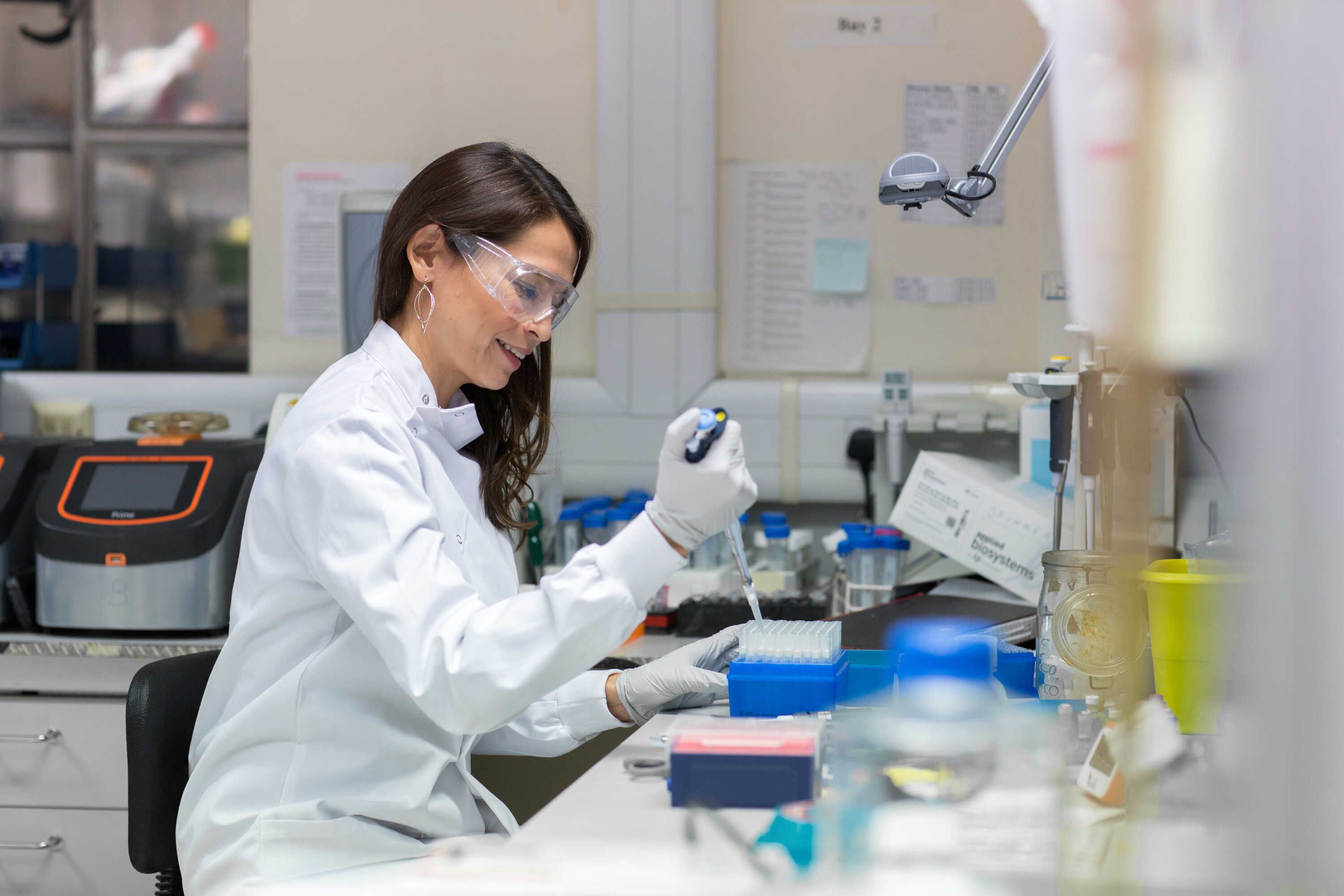
Applied Paediatrics
Advance your understanding of the scientific and evidence base of paediatrics
Advance your understanding of the scientific base of paediatrics and skills in critical evaluation of evidence
Build familiarity with genomic medicine to understand how this underpins both common and rare childhood diseases and its expanding importance to paediatric and neonatal medicine
Evaluate uncertainties and challenges within paediatric healthcare to inform patient management and future directions of innovation and research
Course key facts
Qualification
MSc
Duration
2 years, 3 years
Start date
September 2025
Study mode
Part-time
-
Fees
£15,500 Home
£25,600 Overseas
Delivered by
Location
-
Online
-
Minimum entry standard
2:1 degree in a healthcare related subject such as Nursing, Pharmacy, Physiotherapy, MBBS, or a similar health science
Course overview
Enhance your understanding of the scientific and evidence base of paediatrics on this fully online multidisciplinary course.
Ideal for those working with children and young people in a professional capacity, this programme provides a grounding in paediatric science before allowing you to specialise in topics relevant to your area of practice.
In your second year, you'll focus on one stream choosing from: neonatal medicine, acute paediatrics, specialist paediatrics, or a mixture of all three specialisms. Through these studies, you'll consider high-impact paediatric conditions and the importance of optimising child health trajectories.
Rigorous academic training in research methods is provided in your third year, where you'll apply your skills to a significant research project.
This work will enhance your ability to critically evaluate management strategies and assess future research innovations.
Structure
This page is updated regularly to reflect the latest version of the curriculum. However, this information is subject to change.
Find out more about potential course changes.
Please note: it may not always be possible to take specific combinations of modules due to timetabling conflicts. For confirmation, please check with the relevant department.
You’ll study the following core modules in Year 1.
Core modules
Build an understanding of the scientific basis of evidence-based medicine in child health and disease, including the concepts underpinning evidence-based medicine.
Advance your knowledge of basic genomic science, including genomic architecture, regulatory systems, and genetic variation. Explore current advances in genomic testing.
Module leaders: Dr Harry Leitch and Dr Deena Patel
Develop a systematic understanding of medical law and ethics as applied to paediatric practice, along with a critical awareness of current challenges and new insights in the field.
Module leaders: Dr Deena Patel and Mrs Heather Hanna
Study the concept of assessing a child and enabling them to achieve their optimal health and appreciate the factors, including sleep, which can optimise paediatric health trajectories.
Module leaders: Dr Anthi Thangarajah, Analou Sugar and Dr James DiPasquale
Explore key concepts in child population health and the application of theory and principles in the NHS and globally.
Module leaders: Professor Mitch Blair and Dr Dougal Hargreaves
Teaching and assessment
Teaching and learning methods
-
Lectures
-
Tutorials
-
Expert panel discussions
-
Virtual immersive simulations
-
Group work and presentations
-
Virtual learning environment
Assessment methods
-
Tutor and peer feedback
-
Poster creation and presentations
-
Group work
-
Quizzes
-
Multiple choice exams
-
Presentations
-
Project proposals
-
Public engagement exercises
-
Dissertation
-
Oral assessment
Entry requirements
We consider all applicants on an individual basis, welcoming students from all over the world.
2:1 degree in a healthcare-related subject such as Nursing, Pharmacy, Physiotherapy, MBBS, or a similar health science.
Footnotes
You will be considered for entry into the programme if you have substantial work experience in a related healthcare field, subject to an interview with the programme director.
How to apply
Apply online
You can submit one application form per year of entry. You can choose up to two courses.
Application deadlines - Monday 31 March 2025.
This course is divided into three progressional levels of study. Each level of study leads to a separate qualification:
- PG Certificate (PG Cert)
- PG Diploma (PG Dip)
- MSc
You will exit with one award - the highest that you achieve. You must apply to the PG Cert in the first instance.
Read more about Postgraduate Certificate, Diploma and MSc degrees
There is no application fee for MRes courses, Postgraduate Certificates, Postgraduate Diplomas, or courses such as PhDs and EngDs.
If you are applying for a taught Master’s course, you will need to pay an application fee before submitting your application.
The fee applies per application and not per course.
- £80 for all taught Master's applications, excluding those to the Imperial College Business School.
- £100 for all MSc applications to the Imperial College Business School.
- £150 for all MBA applications to the Imperial College Business School.
If you are facing financial hardship and are unable to pay the application fee, we encourage you to apply for our application fee waiver.
Find out more about how to apply for a Master's course, including references and personal statements.
An ATAS certificate is not required for students applying for this course.
Fees and funding
Home fee
MSc
£15,500 total fee
Top-up from the PG Dip: £3,100
PG Dip
£12,400total fee
Top-up from the PG Cert: £4,650
PG Cert
£7,750total fee
If you complete one of the above qualifications and move on to the next level of study, e.g. you complete the PG Cert and want to study the PG Dip, you will only need to pay the top-up fee for the course you’re applying for.
All applicants must apply to the PG Cert in the first instance, and pay the relevant PG Cert full fee.
If you successfully pass the PG Cert and want to progress to the next level of study (PG Dip), you only need to pay the top-up fee for the PG Dip. The same also applies to move from the PG Dip to the MSc.
The entry tuition fees listed above will apply throughout your progression through the different levels of study, though an annual inflationary increase will also be applied each year.
You should expect and budget for your fees to increase each year.
Your fee is based on the year you enter the university, not your year of study. This means that if you repeat a year or resume your studies after an interruption, your fees will only increase by the amount linked to inflation.
Find out more about our tuition fees payment terms, including how inflationary increases are applied to your tuition fees in subsequent years of study.
Whether you pay the Home or Overseas fee depends on your fee status. This is assessed based on UK Government legislation and includes things like where you live and your nationality or residency status. Find out how we assess your fee status.
If you're a UK national, or EU national with settled or pre-settled status under the EU Settlement Scheme, you may be able to apply for a Postgraduate Master’s Loan from the UK government, if you meet certain criteria.
For courses starting on or after 1 August 2024, the maximum amount is £12,471.
The loan is not means-tested and you can choose whether to put it towards your tuition fees or living costs.
Scholarships
The Dean’s Master’s Scholarships
Value per award
- £10,000
Who it's for
- All students applying to study a Faculty of Medicine Master’s course
The Dr Jean Alero Thomas Scholarships
Value per award
- Partial or full tuition fee at the Home rate
Who it's for
- All students applying to study a Faculty of Medicine lab-based Master’s course
PaeCH MSc award
Value per award
- £1,000
Who it's for
- Students applying to study Applied Paediatrics MSc programme
How will studying at Imperial help my career?
Get practical skills that will be useful for solving complex problems in your professional life.
Develop transferable skills in communication, presentation, case report writing, and journal article writing.
The clinical context of this program is well suited to medical and nursing staff.
Improve your ability to evaluate management strategies and future opportunities for research and innovation.
Further links
Contact the department
Course Director: Dr Deena-Shefali Patel
Visit the Centre for Paediatrics and Child Health website

Request info
Find out more about studying at Imperial. Receive updates about life in our community, including event invites and download our latest Study guide.

Events, tasters and talks
Meet us and find out more about studying at Imperial.

Terms and conditions
There are some important pieces of information you should be aware of when applying to Imperial. These include key information about your tuition fees, funding, visas, accommodation and more.
You can find further information about your course, including degree classifications, regulations, progression and awards in the programme specification for your course.
Programme specifications